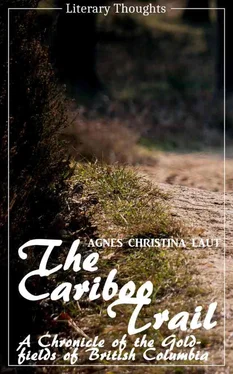So passed Christmas of '57 with plum-pudding and a roasted ox and toasts to the crown and the company, though we cannot be quite sure that the company was not put before the crown in the souls of the fur-traders.
Then, in March 1858, just when Victoria felt most secure as the capital of a perpetual fur realm, something happened. A few Yankee prospectors had gone down on the Hudson's Bay steamer Otter to San Francisco in February with gold dust and nuggets from New Caledonia to exchange for money at the mint. The Hudson's Bay men had thought nothing of this. Other treasure-seekers had come to New Caledonia before and had gone back to San Francisco disappointed. But, in March, these men returned to Victoria. And with them came a mad rabble of gold-crazy prospectors. A city of tents sprang up overnight round Victoria. The smithy was besieged for picks, for shovels, for iron ladles. Men stood in long lines for their turn at the trading-store. By canoe, by dugout, by pack-horse, and on foot, they planned to ascend the Fraser, and they mobbed the company for passage to Langley by the first steamer out from Victoria. Goods were paid for in cash. Before Finlayson could believe his own eyes, he had two million dollars in his safe, some of it for purchases, some of it on deposit for safe keeping. Though the company gave no guarantee to the depositors and simply sealed each man's leather pouch as it was placed in the safe, no complaint was ever made against it of dishonesty or unfair treatment.
Without waiting instructions from England and with poignant memory of Oregon, Governor Douglas at once clapped on a licence of twenty-one shillings a month for mining privileges under the British crown. Thus he obtained a rough registration of the men going to the up-country; but thousands passed Victoria altogether and went in by pack-train from Okanagan or rafted across from Puget Sound. The month of March had not ended when the first band of gold hunters arrived and settled down a mile and a half below Yale. Another boat-load of eight hundred and fifty came in April. In four months sixty-seven vessels, carrying from a hundred to a thousand men each, had come up from San Francisco to Victoria. Crews deserted their ships, clerks deserted the company, trappers turned miners and took to the gold-bars. Before Victoria awoke to what it was all about, twenty thousand people were camped under tents outside the stockade, and the air was full of the wildest rumours of fabulous gold finds.
The snowfall had been heavy in '58. In the spring the Fraser rolled to the sea a swollen flood. Against the turbid current worked tipsy rafts towed by wheezy steamers or leaky old sailing craft, and rickety row-boats raced cockle-shell canoes for the gold-bars above. Ashore, the banks of the river were lined with foot passengers toiling under heavy packs, wagons to which clung human forms on every foot of space, and long rows of pack-horses bogged in the flood of the overflowing river. By September ten thousand men were rocking and washing for gold round Yale.
As in the late Kootenay and in the still later Klondike stampede, American cities at the coast benefited most. Victoria was a ten-hour trip from the mainland. Whatcom and Townsend, on the American side, advertised the advantages of the Washington route to the Fraser river gold-mines. A mushroom boom in town lots had sprung up at these points before Victoria was well awake. By the time speculators reached Victoria the best lots in that place had already been bought by the company's men; and some of the substantial fortunes of Victoria date from this period. Though the river was so high that the richest bars could not be worked till late in August, five hundred thousand dollars in gold was taken from the bed of the Fraser during the first six months of '58. This amount, divided among the ten thousand men who were on the bars around Yale, would not average as much as they could have earned as junior clerks with the fur company, or as peanut pedlars in San Francisco; but not so does the mind of the miner work. Here was gold to be scooped up for nothing by the first comer; and more vessels ploughed their way up the Fraser, though Governor Douglas sought to catch those who came by Puget Sound and evaded licence by charging six dollars toll each for all canoes on the Fraser and twelve dollars for each vessel with decks. Later these tolls were disallowed by the home authorities. The prompt action of Douglas, however, had the effect of keeping the mining movement in hand. Though the miners were of the same class as the 'argonauts' of California, they never broke into the lawlessness that compelled vigilance committees in San Francisco.

Sir James Douglas. From a portrait by Savannah
Judge Howay gives the letter of a treasure-seeker who reached the Fraser in April, the substance of which is as follows:
We're now located thirty miles above the junction of the Fraser and the Thompson on Fraser River... About a fourth of the canoes that attempt to come up are lost in the rapids which extend from Fort Yale nearly to the Forks. A few days ago six men were drowned by their canoe upsetting. There is more danger going down than coming up. There can be no doubt about this country being immensely rich in gold. Almost every bar on the river from Yale up will pay from three dollars to seven dollars a day to the man at the present stage of water. When the river gets low, which will be about August, the bars will pay very well. One hundred and ninety-six dollars was taken out by one man last winter in a few hours, but the water was then at its lowest stage. The gold on the bars is all very fine and hard to save in a rocker, but with quicksilver properly managed, good wages can be made almost anywhere on the river as long as the bars are actually covered with water. We have not yet been able to find a place where we can work anything but rockers. If we could get a sluice to work, we could make from twelve dollars to sixteen dollars a day each. We only commenced work yesterday and we are satisfied that when we get fully under way we can make from five dollars to seven dollars a day each. The prospect is better as we go up the river on the bars. The gold is not any coarser, but there is more of it. There are also in that region diggings of coarser gold on small streams that empty into the main river. A few men have been there and proved the existence of rich diggings by bringing specimens back with them. The Indians all along the river have gold in their possession that they say they dug themselves, but they will not tell where they get it, nor allow small parties to go up after it. I have seen pieces in their possession weighing two pounds. The Indians above are disposed to be troublesome and went into a camp twenty miles above us and forcibly took provisions and arms from a party of four men and cut two severely with their knives. They came to our camp the same day and insisted that we should trade with them or leave the country. We design to remain here until we can get a hundred men together, when we will move up above the falls and do just what we please without regard to the Indians. We are at present the highest up of any white men on the river, and we must go higher to be satisfied. I don't apprehend any danger from the Indians at present, but there will be hell to pay after a while. There is a pack-trail from Hope, but it cannot be travelled till the snow is off the mountains.
The prices of provisions are as follows: flour thirty-five dollars per hundred-weight, pork a dollar a pound, beans fifty cents a pound, and other things in proportion. Every party that starts from the Sound should have their own supplies to last them three or four months, and they should bring the largest size chinook canoes, as small ones are very liable to swamp in the rapids. Each canoe should be provided with thirty fathoms of strong line for towing over swift water, and every man well armed. The Indians here can beat anything alive stealing. They will soon be able to steal a man's food after he has eaten it.
Читать дальше













